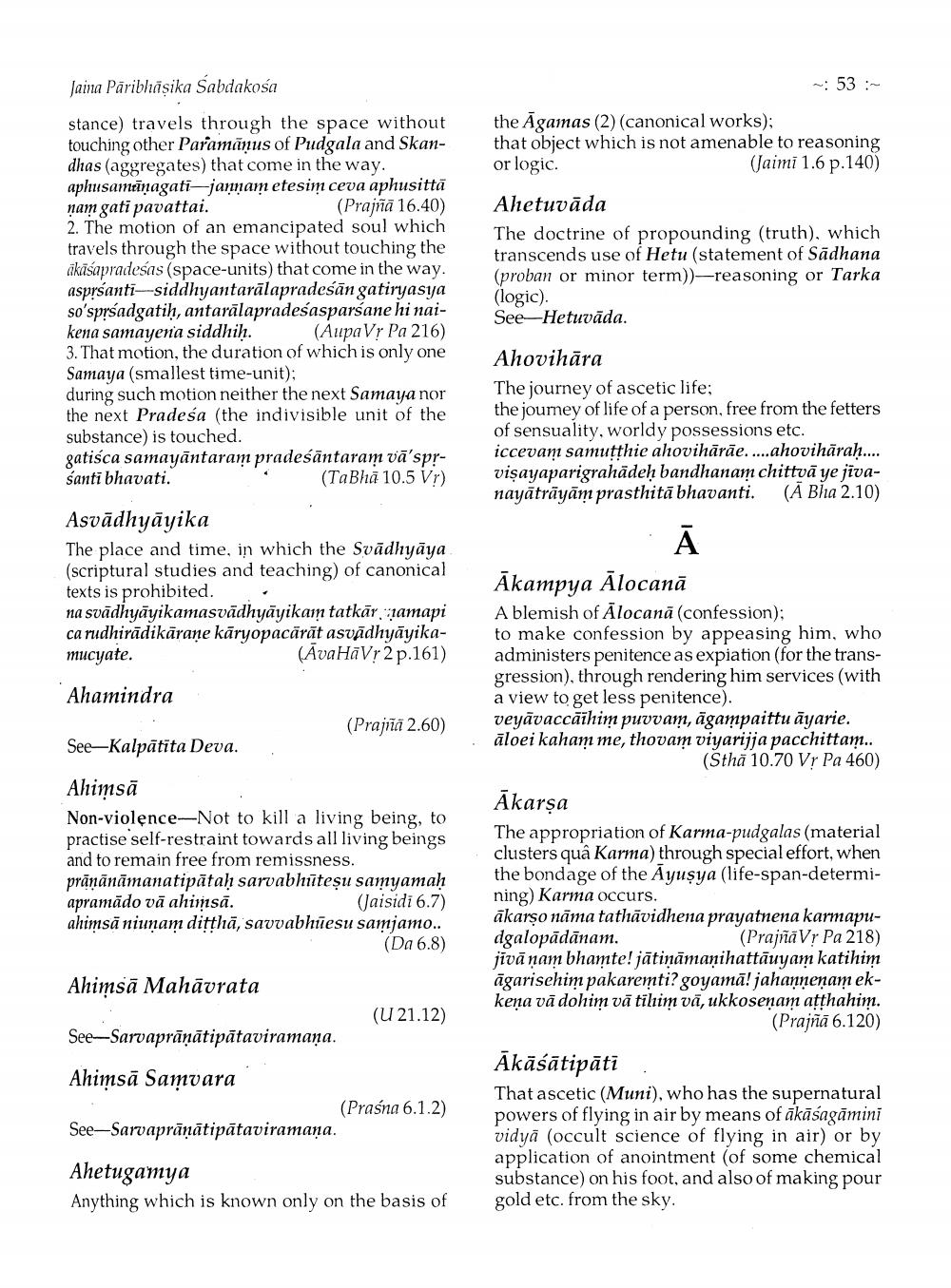________________
- 53 -
the Āgamas (2) (canonical works); that object which is not amenable to reasoning or logic.
(Jaimi 1.6 p.140)
Jaina Pāribhāṣika Sabdakosa stance) travels through the space without touching other Paramānus of Pudgala and Skandhas (aggregates) that come in the way. aphusamrīnagati-jannametesim ceva aphusittä nam gati pavattai.
(Prajña 16.40) 2. The motion of an emancipated soul which travels through the space without touching the ākāsapradesas (space-units) that come in the way. asprsanti--siddhyantarālapradeśāngatiryasya so'sprsadgatiḥ, antarālapradeśasparsane hi naikena samayena siddhiḥ. (Aupa Vr Pa 216) 3. That motion, the duration of which is only one Samaya (smallest time-unit); during such motion neither the next Samaya nor the next Pradesa (the indivisible unit of the substance) is touched. gatisca samayāntaram pradeśāntaram vā'sprsanti bhavati.
(Ta Bhā 10.5 Vr)
Ahetuvāda The doctrine of propounding (truth), which transcends use of Hetu (statement of Sadhana (proban or minor term)-reasoning or Tarka (logic). See-Hetuvāda.
Ahovihāra The journey of ascetic life; the journey of life of a person, free from the fetters of sensuality, worldy possessions etc. iccevam samutthie ahovihārāe.....ahovihāraḥ.... vişayaparigrahādeh bandhanam chittvā ye jivanayātrāyām prasthitā bhavanti. (A Bha 2.10)
Asvādhyāyika The place and time, in which the Svādhyāya (scriptural studies and teaching) of canonical texts is prohibited. na svādhyāyikamasvādhyāyikam tatkār zamapi ca rudhirādikarane kāryopacārāt asvādhyāyikamucyate.
(AvaHaVr 2 p.161)
Ā Ākampya Alocanā A blemish of Alocanā (confession); to make confession by appeasing him, who administers penitence as expiation (for the transgression), through rendering him services (with a view to get less penitence). veyāvaccāihim puvvam, āgampaittu āyarie. āloei kaham me, thovam viyarija pacchittam..
(Stha 10.70 Vr Pa 460)
Ahamindra
(Prajā 2.60)
See-Kalpātīta Deva.
Ahimsā Non-violence-Not to kill a living being, to practise self-restraint towards all living beings and to remain free from remissness. prānānāmanatipātaḥ sarvabhiītesu samyamah apramādo vā ahimsā.
(Jaisidi 6.7) ahimsā niunam ditthā, savvabhūesu samjamo..
(Da 6.8)
Akarsa The appropriation of Karma-pudgalas (material clusters quâ Karma) through special effort, when the bondage of the Ayuşya (life-span-determining) Karma occurs. ākarso nāma tathāvidhena prayatnena karmapudgalopādānam.
(PrajnaVr Pa 218) jīvā ņam bhamte! jātināmaņihattāuyam katihim āgarisehim pakaremti? goyamā! jahannenam ekkeņa vā dohim vā tilim vā, ukkosenam atthahim.
(Prajna 6.120)
Ahimsā Mahāvrata
(U 21.12)
See-Sarvaprāņātipātaviramaņa.
Ahimsā Samvara
(Prasna 6.1.2) See-Sarvaprāņātipātaviramana.
Akāśātipāti That ascetic (Muni), who has the supernatural powers of flying in air by means of ākāśagāmini vidyā (occult science of flying in air) or by application of anointment (of some chemical substance) on his foot, and also of making pour gold etc. from the sky.
Ahetugamya Anything which is known only on the basis of




